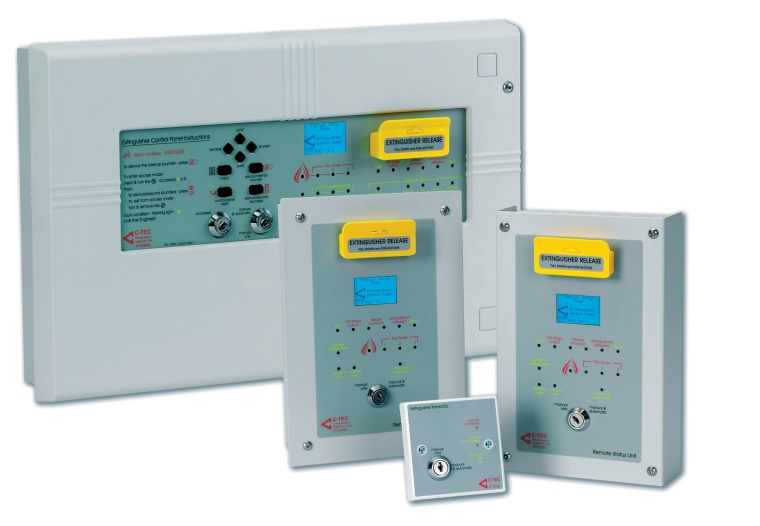C-Tec: automatic extinguisher systems
C-Tec: automatic extinguisher systems. With the growing emphasis on safeguarding property as well as people and society’s increasing reliance on computerised systems, the market fo...


C-Tec: automatic extinguisher systems. With the growing emphasis on safeguarding property as well as people and society’s increasing reliance on computerised systems, the market for automatic fire suppression systems is booming. On the back of this demand C-TEC has launched its first-ever fully EN12094 part 1 compliant automatic extinguisher panel – the EP203. In this article, C-Tec’s Managing Director Andrew Foster explains why he believes the panel is destined to become an installers’ favourite.
Extinguishant Systems on the Increase
Although safeguarding people is an obvious mandate for any fire alarm system, protecting property and the systems that allow businesses to function correctly comes a close second. Few medium to large sized businesses can now operate without an IT department and it is therefore essential the technology they are using receives sufficient protection from fire. A small unattended blaze in a server room can destroy not only thousands of pounds worth of equipment, it can cause hours of down-time from which it can be extremely difficult to recover.
In areas such as chemical plants, the consequences of a fire can be even worse, so it’s no wonder the provision of extinguishant systems is on the increase. Extinguishant systems work by controlling the release of fire-suppressing gas into areas where fires need to be put out quickly with minimal damage to the equipment being protected. Despite the increased demand for them, the perceived specialist nature of their installation has led to many fire alarm companies shying away from them.
C-Tec believes the introduction of its EP203 panel will go a long way towards changing this.
Automatic Systems
A typical automatic extinguisher system comprises the fire suppressing agent – usually an inert gas such as Argonite - storage containers, release valves, fire detectors, the control panel, delivery piping and dispersion nozzles. Fitting such a system obviously requires a degree of expertise but what appears to frighten most installers off is the fear of programming the system incorrectly and inadvertently releasing the gas. Although the noise from a sounder can be switched off at the touch of a button, replacing gas that has been accidentally released from a network of canisters can cost a small fortune.
This is where the EP203 comes in. It is the first EN12094 part 1 compliant panel to feature an intuitive 128 x 64 pixel two-colour backlit graphic display that gives clear and concise feedback to the user, installer and commissioning engineer. This allows you to commission with confidence as the graphic interface lets you program the system without having to refer to complicated LED arrays, convoluted seven-segment displays and a look-up sheet to help decipher what it is you’re selecting. Everything is in plain English.
Simple and Powerful
Despite this simplicity, the EP203 is one of the most powerful extinguisher panels on the market with a comprehensive range of features and ancillaries that make it suitable for use in computer rooms, telecommunication centres, archive storage areas, chemical plants, generator rooms, museums and more. It includes three conventional detector circuits and three conventional sounder circuits (two x first stage, one x second stage), all of which are line monitored for open and short circuit faults.
Any combination of activated detector zones – including triple knock or double knock! – can be programmed to automatically activate the panel’s extinguishant release sequence, which can be set to operate with or without a delay. No less than six monitored inputs are provided, including Hold and Abort for suspending or cancelling the release sequence at any time and an optional relay expansion board can provide monitored reset, mode, discharged, hold and abort outputs. The panel is supplied in an elegantly-styled, durable enclosure with all of its electronics – apart from its powerful 3A EN54 switch mode PSU – mounted on a detachable metal bridge plate for ease of installation.
In addition to its backlit display, the enclosure’s front also features a manual extinguisher release mechanism (featuring two buttons to reduce the likelihood of false triggering) and a keyswitch allowing authorised users to toggle between automatic and manual mode. For additional flexibility, up to eight flush or surface remote status units, each with their own graphic displays, manual release mechanisms and mode switches, can be connected to the panel via a monitored RS485 bus.
Single gang economy status units without a graphic display can also be purchased. Other features include adjustable flood times, an alarm counter that records the number of occasions the panel has been in alarm, a timestamped log, support for up to two solenoids or multiple Metrons and volt-free changeover relay contacts for fire, local fire, first stage active, second stage active, extract fan and fault.
Compliant to EN12094
The EP203 also includes all of the options with requirements of EN12094 part 1 (Fixed fire fighting systems – Components for gas extinguishing systems – Requirements and test methods for electrical automatic control and delay devices) including:
- ‘Delay of extinguishing signal’ – delay time from 0 to 60 seconds.
- ‘Signal representing the flow of extinguishing agent’ to indicate the flow of the extinguishing agent.
- ‘Monitoring of the status of components’ by way of a low pressure switch input.
- ‘Emergency hold device’ to enable the extinguishant delay time to be extended.
- ‘Control of flooding time’ to deactivate the releasing output after a set time period.
- ‘Manual only mode’ to disable the release of extinguishant via automatic detection devices.
- ‘Triggering of equipment outside the system’ by way of first and second stage contacts, etc.
- ‘Emergency abort device’ to inhibit the extinguishing signal until the emergency abort device has been deactivated.
- ‘Activation of alarm devices with different signals’ to indicate pre-discharge and released warnings using different sounds.
We believe that no other panel can offer all of the above and the EP203’s extensive range of commissioning and engineering functions. It believes these features, coupled with the panel’s competitive pricing structure and ease of programming, make it the choice for experienced and novice installers alike.
Contact:
Alex Saint
C-Tec,
Wigan, United Kingdom
Tel.: +44 1942 403 810
Fax: +44 1942 829 867
sales@c-tec.co.uk
www.c-tec.co.uk
most read

Safety and Security in an Emergency: How companies take responsibility with strategic personal protection and amok prevention
Personal protection & amok prevention: strategic concepts, training & responsibility for corporate safety and security

Training at Fraunhofer SIT: Strengthening resilience against cyber attacks
Knowledge in cyber security is evolving rapidly - continuous training is therefore important.

When the Internet stumbles: Why DNS is important
When DNS fails, the internet stumbles-AWS outage proves resilience and redundancy are vital for digital trust

Assa Abloy's battery-powered Aperio KL100 secures lockers
Boost workplace security and operational flexibility by securing more than just doors.

Airbus Defence and Space: Security as a strategic pillar of Europe's defense capability
Airbus Defence and Space protects sites, technologies and employees with modern security and cyber solutions - strengthening Europe's resilience in uncertain times









